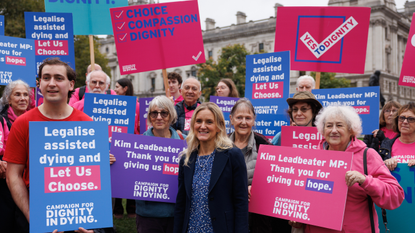Assisted dying: what can we learn from other countries?
A look at the world's right to die laws as MPs debate Kim Leadbeater's proposed bill

Assisted dying is a broad term, which encompasses both assisted suicide and euthanasia. Assisted suicide is facilitated by another person, usually a physician providing a lethal medication so that a terminally ill person can end their own life (though it can also encompass helping a person to travel to another jurisdiction to die there). Euthanasia is the act of a medical professional actually administering drugs in order to end a person's life.
What is the law in the UK?
In the UK, both assisted suicide and euthanasia are illegal. In England and Wales, euthanasia is considered murder or manslaughter, and "encouraging or assisting" a suicide is illegal under the Suicide Act 1961. The CPS uses complex charging guidelines that mean people will mostly not be charged under the Suicide Act if they are motivated by compassion, and if the person they assisted had made a "clear decision" to die; but some prosecutions still occasionally occur. (The law in Scotland is broadly comparable.) Withdrawing or withholding care, or using strong sedatives that advance death, are regarded as legally distinct, if ending life is not the main aim.
Where is assisted dying currently legal?
It is legal, to some extent, in 11 nations, as well as in 11 US states and all but one of Australia's jurisdictions. The first country to legalise assisted dying was Switzerland, which made assisted suicide legal in 1937 on the proviso that those assisting do not have a "selfish" motive. No other jurisdiction followed suit until 1997, when the US state of Oregon passed a law legalising physician-assisted suicide in limited circumstances. In 2002, the Netherlands legalised both assisted suicide and, in a world first, euthanasia.
Subscribe to The Week
Escape your echo chamber. Get the facts behind the news, plus analysis from multiple perspectives.

Sign up for The Week's Free Newsletters
From our morning news briefing to a weekly Good News Newsletter, get the best of The Week delivered directly to your inbox.
From our morning news briefing to a weekly Good News Newsletter, get the best of The Week delivered directly to your inbox.
Since then, more jurisdictions have followed: besides the above, assisted dying is now legal in countries including Austria, Belgium, Canada, Colombia, Ecuador, Luxembourg, New Zealand, Portugal and Spain; in total, at least 200 million people have access to it. As well as in the UK and Jersey, parliaments in France and the Isle of Man are considering such laws.
How do the regimes differ?
Mainly, in two respects: whether they allow euthanasia, or just assisted suicide; and how tightly drawn are the conditions in which they are permitted. Among the strictest is Oregon. There, a person seeking the right to die must be over 18, terminally ill and likely to live for less than six months; he or she must also be capable not just of making decisions, but of administering lethal drugs prescribed by a doctor.
At the other end of the spectrum is the Netherlands, where both assisted suicide and euthanasia are legal, if the patient is either terminally ill or enduring "unbearable suffering" without prospect of relief, including from mental illness; anyone over 12 can request it, though parental consent is required for minors under 16. Belgium has a similar law.
How widely used are these laws?
It depends on how liberal they are. In Oregon, in 2023, 560 people, mostly cancer patients, received prescriptions under the Death with Dignity Act; a reported 367 died from the drugs prescribed – about 0.8% of total deaths in the state. In California, which has similar laws, the rate was even lower (about 0.3%). By contrast, in the Netherlands, assisted dying accounted for 9,068 deaths in 2023 – around 5.4% of total deaths. Canada, meanwhile, has gained a reputation as the "world capital" of assisted dying, and is seen by many as a cautionary case. In 2022, the last year for which full figures are available, there were 13,241 "medical assistance in dying" (Maid) deaths, 4.1% of the total.
Why is Canada regarded as a cautionary case?
It's a classic instance of the "slippery slope". When Canada's first euthanasia bill, limited to those with terminal illness, was passed in 2016, ministers predicted "perhaps 100" deaths a year. Since then it has been extended to physical illness and disability which "cannot be relieved"; and deaths have risen to a level more than 100 times that predicted. In a 2022 survey, most of those ending their lives under Maid cited the "loss of ability to engage in meaningful life activities" as their reason; but more than a third said their decision was, in part, informed by a sense that they were a burden on family, friends or caregivers; 17% cited "isolation or loneliness". In some high-profile cases, people with disabilities have been reportedly pushed towards suicide; euthanasia has arguably been used in the place of a social safety net. One woman was offered Maid instead of an access ramp for her wheelchair.
What do defenders of the Canadian system say?
Advocates of the right to die view the increase in uptake in Canada as evidence of a system working as it should, effectively meeting demand; and they note that in the 2022 survey, 96.5% of people choosing to die faced terminal illnesses or imminent death. Only 463 chose to die because of a chronic condition, in a nation of 40 million. Banning euthanasia, advocates argue, prevents those who are physically unable to end their own lives from doing so.
How might the law change here?
On 29 November, a private members' bill put forward by Labour MP Kim Leadbeater will be debated by MPs. Full details of the bill have not yet been published, but it is expected to be similar to one proposed in the House of Lords earlier this year, which cleaved to the Oregon model: terminally ill adults with six months or less to live would be able to get medical help to end their lives. The last time MPs debated such a bill, in 2015, they voted against it by 330 to 118. It seems likely that there is a majority in favour today, though private members' bills are vulnerable to derailment. And it would certainly be controversial: Oregon's laws, though less contentious than Canada's, are still much criticised.
Sign up for Today's Best Articles in your inbox
A free daily email with the biggest news stories of the day – and the best features from TheWeek.com
-
 UK gynaecological care crisis: why thousands of women are left in pain
UK gynaecological care crisis: why thousands of women are left in painThe Explainer Waiting times have tripled over the past decade thanks to lack of prioritisation or funding for women's health
By Harriet Marsden, The Week UK Published
-
 'The Hum': the real-life noise behind The Listeners
'The Hum': the real-life noise behind The ListenersIn The Spotlight Can some of us also hear the disturbing sound that plagues characters in the hit TV show – and where is it coming from?
By Chas Newkey-Burden, The Week UK Published
-
 The Week Unwrapped: Are we any closer to identifying UFOs?
The Week Unwrapped: Are we any closer to identifying UFOs?Podcast Plus, will deals with Tunisia and Kurdistan help Labour? And what next for the Wagner Group?
By The Week Staff Published
-
 The rules for armed police in the UK
The rules for armed police in the UKThe Explainer What the law says about when police officers can open fire in Britain
By The Week Staff Published
-
 How would assisted dying work in the UK?
How would assisted dying work in the UK?The Explainer Proposed law would apply to patients in England and Wales with less than six months to live – but medics may be able to opt out
By Harriet Marsden, The Week UK Published
-
 Assisted dying: will the law change?
Assisted dying: will the law change?Talking Point Historic legislation likely to pass but critics warn it must include safeguards against abuse
By The Week UK Published
-
 Smoking ban: the return of the nanny state?
Smoking ban: the return of the nanny state?Talking Point Starmer's plan to revive Sunak-era war on tobacco has struck an unsettling chord even with some non-smokers
By The Week UK Published
-
 The Just Stop Oil five: 'fanatics' or victims of anti-protest authoritarianism?
The Just Stop Oil five: 'fanatics' or victims of anti-protest authoritarianism?In The Spotlight Climate protesters handed longest-ever prison sentences for peaceful protest
By The Week UK Published
-
 The EU's landmark AI Act 'rushed' out as countdown begins on compliance
The EU's landmark AI Act 'rushed' out as countdown begins on complianceThe Explainer 'We will be hiring lawyers while the rest of the world is hiring coders' – Europe's warning about new AI legislation
By Harriet Marsden, The Week UK Published
-
 Where does Labour stand on trans rights?
Where does Labour stand on trans rights?The Explainer Party plans to 'modernise and simplify' process of changing gender and vows to scrap guidance on teaching gender ideology in schools
By The Week UK Published
-
 LGBTQ+ rights in Iraq: how morality laws ramped up
LGBTQ+ rights in Iraq: how morality laws ramped upThe Explainer Same-sex relationships and gender reassignment surgery are now criminalised in latest attack on targeted community
By The Week UK Published